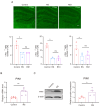Homocysteine Mediates Cognitive Inflexibility Induced by Stress via Targeting PIN1
- PMID: 40309848
- PMCID: PMC12025967
- DOI: 10.3390/brainsci15040416
Homocysteine Mediates Cognitive Inflexibility Induced by Stress via Targeting PIN1
Abstract
Background: Increasing evidence shows that HCY plays an important role in stress-induced cognitive dysfunction, and HCY significantly promotes the decline of cognitive function. Stress has been reported to cause elevated HCY in the hippocampus of mice. Cognitive flexibility refers to the ability of individuals to quickly adjust their neurobehavioral strategies to different situations or to solve different tasks.
Aims: This study aims to explore the role of HCY in the impairment of cognitive flexibility induced by stress and its possible regulatory mechanism.
Methods and results: First, we examined changes in the protein and mRNA levels of the cognitive flexibility effector molecule, PIN1, during stress in mice. The results show that stress can cause a decline in cognitive flexibility in mice and lead to an increase in PIN1. Moreover, through the use of in vitro experiments, we found that HCY could induce an increase in PIN1 expression in neurons. Further in vivo experiments were used to investigate the effect of VitB on HCY and PIN1 and evaluated the therapeutic effect of VitB on stress-induced impairment of cognitive flexibility. The results show that VitB decreased the levels of HCY in plasma and the hippocampus, alleviated the stress-induced impairment of cognitive flexibility, and reduced the expression of PIN1.
Conclusions: These results suggest that the impairment of cognitive flexibility induced by stress can be inhibited by regulating the content of HCY. Collectively, our findings highlight therapeutic strategies aimed at improving HCY treatment for impairments in cognitive flexibility.
Keywords: HCY; PIN1; cognitive flexibility; stress.
Conflict of interest statement
The authors declare that there are no conflicts of interest.
Figures






References
-
- Rungsattatharm L., Tasingha P., Trairatvorakul P., Chonchaiya W. Longitudinal associations between executive function and positive parenting during early childhood and resilience, self-regulation, and behavioral problems in school-age children. Child Adolesc. Psychiatry Ment. Health. 2025;19:19. doi: 10.1186/s13034-025-00875-8. - DOI - PMC - PubMed
-
- Koithan E.M., Demeter D.V., Ali S.A., Feigelis M., Greene D.J. Cognitive flexibility in neurodevelopmental disorders: Insights from neuroimaging and neuropsychology. Curr. Opin. Behav. Sci. 2024;59:101429. doi: 10.1016/j.cobeha.2024.101429. - DOI
-
- Aumer P., Brandt G.A., Hirjak D., Bähner F. Impaired cognitive flexibility in schizophrenia: A systematic review of behavioral and neurobiological findings. Biomark. Neuropsychiatry. 2024;11:100111. doi: 10.1016/j.bionps.2024.100111. - DOI
LinkOut - more resources
Full Text Sources
Miscellaneous

